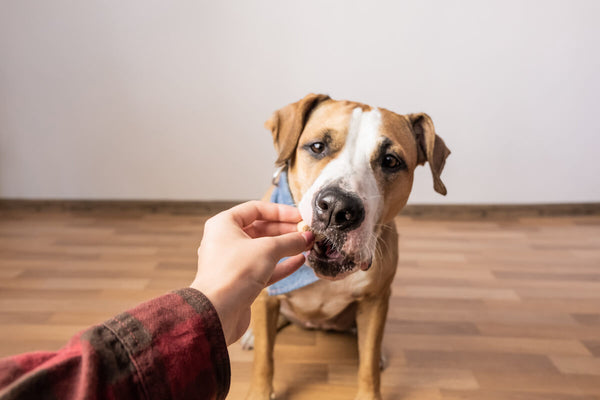What to Look for in Calming Treats for Dogs

Supplements arent regulated by the FDA — that goes for both human supplements and dog supplements. So, its up to you to determine the quality and efficacy of any supplement you give to your best friend.
Well go over the best active ingredients to look for in a calming formula below. But to determine the overall quality of a supplement, you should look at the inactive ingredients as well.
Products that use certified organic ingredients will have higher quality standards than products that dont. You should also look for formulas that are free of artificial preservatives and fillers. And whenever you have the option, choose whole food ingredients, like chicken and peanut butter, over heavily processed ingredients, like chicken flavor and peanut butter flavor.
Avoid treats with CBD because the ingredient isnt well-researched in animals — there are few scientific studies into the calming effects of CBD in dogs. There is, however, scientific evidence that giving CBD to dogs increases their level of alkaline phosphate — an important liver enzyme. Researchers arent sure what effect long-term CBD use might have on dogs livers.
Err on the side of caution by choosing these active ingredients instead.
Melatonin
Melatonin is a natural hormone that your dogs (and your own) body produces to prepare for rest. This supplement made headlines for its calming effect on dogs as early as the 1990s. And one study found that giving dogs melatonin before surgery helped them remain more calm throughout the process.
In spite of its efficacy, you should never share melatonin supplements for people with your canine companion. A chewy dog treat that contains melatonin is much safer because it will contain a dose thats appropriate for a dogs weight and metabolism.
L-Theanine
L-theanine is a phytochemical that occurs naturally in green tea leaves. A study on dogs with behavioral issues found dogs that ate a diet rich in L-theanine had reduced levels of cortisol, a stress hormone. A similar study in cats found that cats exhibited lower stress levels after receiving L-theanine for 30 days.
QUIET MOMENTS REVIEW
Do your dogs get upset when you leave them alone? Maybe they howl or bark or even destroy furniture while you’re away. Do loud noises, such as fireworks, cause your pup to run away in fear? These are all signs your beloved pet could be experiencing a form of anxiety. Dogs experience anxiety the same way that humans can.
“Dogs typically experience one of three main types of anxiety: general fear such as noise sensitivity or a fear of strangers, separation anxiety, and stress due to aging and health concerns,” says Danielle Bernal, BVSc, MRCVS, a Massachusetts-based veterinary professional with WHIMZEES Daily Dental Treats.
When it comes to treating dog anxiety, there is a lot to consider including implementing changes to your pet’s environment, providing plenty of opportunity for play and exercise, removal of triggering stimuli—and even medication in more extreme cases.
Common causes of anxiety in dogs are loud noises (like storms, fireworks, or vacuums/roombas), being left alone (separation anxiety), being in strange places, or meeting new people and animals, says Gary Richter, DVM, a veterinarian and veterinary health expert with Rover. For some dogs, being in a car can trigger anxiety, too. Different types of anxiety are also affected by an individual dog’s training and personality, Dr. Richter says.